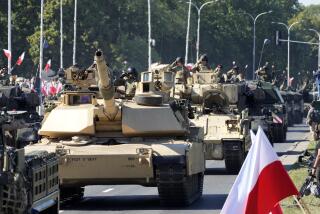NATO Report Challenges U.S. Critics on Sharing of Military Burden
- Share via
BRUSSELS — The North Atlantic Treaty Organization issued a major report Thursday aimed at disarming congressional critics who say European members are not doing enough in their own defense, but it conceded that several members should be doing more.
The 80-page document, which calls for additional funding for NATO, is a milestone, one senior U.S. delegate to a NATO defense ministers meeting here said, adding that American critics should be “impressed with its candor.”
A major thrust of the new report, which took months to prepare, was to suggest that so-called “burden sharing” cannot be measured solely by the number of troops that a nation fields, nor by the percentage of national income devoted to defense.
Critics in Congress have threatened to pull out some of the 326,000 American service personnel based in Europe if European NATO members do not contribute more to their own defense budgets. Such a move has been staunchly resisted by NATO and conservative leaders in Europe, for fear it would display weakness to the Soviet-led Warsaw Pact.
In defense of the European position, the report emphasized the “shared roles, risks and responsibilities” rather than the “burden-sharing” element stressed by American critics. European members supply 70% of the manpower, 70% of the tanks, 80% of the artillery and 80% of the combat aircraft on NATO’s border with the Warsaw Pact, it said.
And, in an implied rejoinder to critics, the document declared: “The provision of money and people is not an end in itself. What counts is how these inputs are translated into defense capabilities.”
West Germany also requested the defense ministers of the 16-member alliance to consider creating a four-nation airborne division that would operate within West German borders and to determine if low-level aircraft training and large-scale maneuvers could be reduced.
The low-flying jet and helicopter missions have annoyed West Germans for years and recently have become a focus of anti-NATO and anti-American sentiment, West German observers say.
In addition, the report cited the fact that troops and equipment trundled over local soil, that soldiers were inconveniently based among the population and that most European nations had unpoplar military conscription to keep their armed forces up to strength.
“Because of the density of military on European territory,” it said, the Europeans bore an “unusually high social cost.”
Qualitative Factors
And the document declared that it is “difficult to quantify--in terms of dollars--factors that were basically qualitative.”
As an example, the report cited one unnamed country that devoted 6% of its gross national product to defense, while only 2% of its population was in the regular and reserve forces. But another nation apportioned only 3% of its GNP to defense, while 7% of its population was militarily trained and ready for mobilization.
“These do not lend themselves to a simple addition,” the report said. As to which of the two constituted a heavier burden, it added that the issue “is very much a matter of subjective perception.”
Referring to the United States, the document stated: “It is a fact of life that the most important military contribution to collective defense, that of the United States, is subject to a particular scrutiny by the U.S. Congress under the aspect of burden-sharing, and that the perception that the U.S. is carrying an unduly high share of the burden will have far-reaching consequences for NATO’s overall defense posture.”
More to Read
Sign up for Essential California
The most important California stories and recommendations in your inbox every morning.
You may occasionally receive promotional content from the Los Angeles Times.








